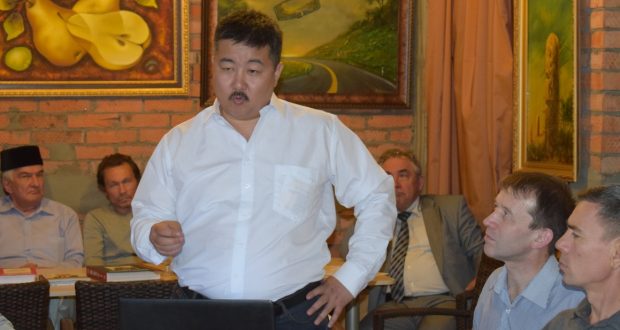On June 11, the International Round Table “The problem of preservation and use of regional languages and languages of national minorities
13.06. 2018
On June 11, the International Round Table “The problem of preservation and use of regional languages and languages of national minorities within the framework of the Constitution of Russia and international law” was held on the Day of Russia in Moscow at the residence of the “Shtab Tatar ( Staff of Tatars)” on Taganskaya.
The event was organized by ANO Center for Strategic Development Modeling, International Diplomatic Club “Amicabilility”, Public organization “Fund for the Development of Muslim Peoples”, Public Organization “Moscow Tatars Headquarters(Shtab Tatar Moskvy)”, Democratic Congress of the Peoples of the Russian Federation, UNESCO MGIMO Department of the Russian Ministry of Foreign Affairs, Russian associat6ion of promoting the UN.
The conference discussed the history of the study and use of native languages in Russia and in the USSR; Russian Constitution and legislation on languages; The European Charter for Regional or Minority Languages, the UN documents. Representatives of the peoples of Russia, academicians, scientists, public figures and others took part in the event. There were representatives from Tatarstan in the person of the scientist Marat Lutfullin and the chairman of the Tatar social center Farita Zakiev. Also, public figures from Mari El, Kalmykia and other regions took part.
On behalf of the round table, a resolution has been adopted, where it is noted that in recent years the area of use of native languages has been shrinking at a sharp pace.
“Attempts to legislatively restrict schooling in the native languages of indigenous peoples, as well as the state languages of the republics, ultimately lead to the loss of languages, and along with them – the loss of original cultures and the disappearance of peoples that have existed from time immemorial, coexisting on Russian soil. These peoples are in fact the gene pool of the people of the Russian Federation, their destruction is unacceptable under the United Nations Convention on Biological Diversity, ratified by Federal Law No. 16-FZ of February 17, 1995. Such actions also contradict the Constitution of the country and other legal norms, in particular, the Federal Law “On the languages of the peoples of the Russian Federation” of October 25, 1991, “the resolution says.
The participants of the round table declare that the principle of voluntary study of state languages introduced under the pretext of respect for human rights is nothing more than an attempt on the statehood of the peoples of the Russian Federation, an integral part of Russian federalism, the basis of the state system.
As written in the resolution, without waiting for changes in the legislation, federal state educational standards (GEF) launched an offensive against native languages. As a result, in Tatarstan alone, the staff of more than 1,200 teachers, which has been formed for decades, has already been sent for retraining.
The participants of the round table consider that the bill “On Amendments to the Federal Law” On Education in the Russian Federation “should be removed from consideration, as well as to bring the GEFs to their previous state.
“State languages in national republics must be mandatory for their citizens. We believe that it is necessary to substantially refine this law, as well as the Federal Law “On the Languages of the Peoples of the Russian Federation”, etc., regarding the provision of a broad rostrum to the peoples of Russia in the central mass media, the state’s obligations to expand the use of native languages of indigenous peoples in accordance with international norms, education in native language, sufficient for continuing further education in the country’s universities, etc. “- sure the participants of the round table.
Press service
the “Staff” of the Tatars of Moscow

